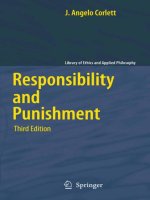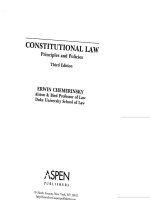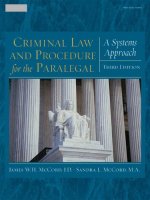Law and Administration Third Edition pot
Bạn đang xem bản rút gọn của tài liệu. Xem và tải ngay bản đầy đủ của tài liệu tại đây (2.9 MB, 881 trang )
This page intentionally left blank
Law and Administration
As the branch of law dealing with the exercise of governmental power, and
so directly concerned with politics, policy issues and good governance values,
administrative law can challenge even the advanced student. In response, this
classic text looks at both the law and the factors informing it, elaborating the
foundations of the subject. is contextualised approach allows the reader to
develop a broad understanding of the subject. e authors consider the dis-
tinctive theoretical frameworks which inform study of this challenging subject.
Case law and legislation are set out and discussed and the authors have built
in a range of case studies, to give a clear practical dimension to the study. is
new and updated edition will cement the title’s prominent status.
Carol Harlow FBA, QC (Hon), is Emerita Professor of Law at the London School
of Economics and Political Science
Richard Rawlings is Professor of Public Law at University College LondonThe Law in Context Series
Editors: William Twining (University College London), Christopher McCrudden
(Lincoln College, Oxford) and Bronwen Morgan (University of Bristol).
Since 1970 the Law in Context series has been in the forefront of the movement to
broaden the study of law. It has been a vehicle for the publication of innovative schol-
arly books that treat law and legal phenomena critically in their social, political and
economic contexts from a variety of perspectives. e series particularly aims to publish
scholarly legal writing that brings fresh perspectives to bear on new and existing areas
of law taught in universities. A contextual approach involves treating legal subjects
broadly, using materials from other social sciences, and from any other discipline that
helps to explain the operation in practice of the subject under discussion. It is hoped
that this orientation is at once more stimulating and more realistic than the bare exposi-
tion of legal rules. e series includes original books that have a di erent emphasis from
traditional legal textbooks, while maintaining the same high standards of scholarship.
ey are written primarily for undergraduate and graduate students of law and of other
disciplines, but most also appeal to a wider readership. In the past, most books in the
series have focused on English law, but recent publications include books on European
law, globalisation, transnational legal processes, and comparative law.
Books in the Series
Anderson, Schum and Twining: Analysis of Evidence
Ashworth: Sentencing and Criminal Justice
Barton and Douglas: Law and Parenthood
Beecher-Monas: Evaluating Scienti c Evidence: An interdisciplinary framework for
intellectual due process
Bell: French Legal Cultures
Bercusson: European Labour Law
Birkinshaw: European Public Law
Birkinshaw: Freedom of Information: e law, the practice and the ideal
Cane: Atiyah’s Accidents, Compensation and the Law
Clarke and Kohler: Property Law: Commentary and materials
Collins: e Law of Contract
Cranston: Legal Foundations of the Welfare State
Davies: Perspectives on Labour Law
Dembour: Who Believes in Human Rights?: e European Convention in question
de Sousa Santos: Toward a New Legal Common Sense
Diduck: Law’s Families
Elworthy and Holder: Environmental Protection: Text and materials
Fortin: Children’s Rights and the Developing Law
Glover- omas: Reconstructing Mental Health Law and Policy
Goldman: Globalisation and the Western Legal Tradition: Recurring patterns of law and
authority
Gobert and Punch: Rethinking Corporate Crime
Harlow and Rawlings: Law and Administration
Harris: An Introduction to Law
Harris, Campbell and Halson: Remedies in Contract and Tort
Harvey: Seeking Asylum in the UK: Problems and prospects
Hervey and McHale: Health Law and the European Union
Holder and Lee: Environmental Protection, Law and Policy
Kostakopoulou: e Future Governance of Citizenship
Lacey, Wells and Quick: Reconstructing Criminal Law
Lewis: Choice and the Legal Order: Rising above politics
Likosky: Transnational Legal Processes
Likosky: Law, Infrastructure and Human Rights
Maughan and Webb: Lawyering Skills and the Legal Process
McGlynn: Families and the European Union: Law, politics and pluralism
Mo at: Trusts Law: Text and materials
Monti: EC Competition Law
Morgan and Yeung: An Introduction to Law and Regulation: Text and materials
Norrie: Crime, Reason and History
O’Dair: Legal Ethics
Oliver: Common Values and the Public–Private Divide
Oliver and Drewry: e Law and Parliament
Picciotto: International Business Taxation
Reed: Internet Law: Text and materials
Richardson: Law, Process and Custody
Roberts and Palmer: Dispute Processes: ADR and the primary forms of decision-making
Scott and Black: Cranston’s Consumers and the Law
Seneviratne: Ombudsmen: Public services and administrative justice
Stapleton: Product Liability
Tamanaha: e Struggle for Law as a Means to an End
Turpin and Tomkins: British Government and the Constitution: Text and materials
Twining: General Jurisprudence: Understanding Law from a Global Perspective
Twining: Globalisation and Legal eory
Twining: Rethinking Evidence
Twining and Miers: How to Do ings with Rules
Ward: A Critical Introduction to European Law
Ward: Law, Text, Terror
Ward: Shakespeare and Legal Imagination
Zander: Cases and Materials on the English Legal System
Zander: e Law-Making Process
Law and Administration
Third Edition
CAROL HARLOW
FBA, QC (Hon), Emerita Professor of Law at the London School of Economics and
Political Science
RICHARD RAWLINGS
Professor of Public Law at University College London
CAMBRIDGE UNIVERSITY PRESS
Cambridge, New York, Melbourne, Madrid, Cape Town, Singapore,
São Paulo, Delhi, Dubai, Tokyo
Cambridge University Press
The Edinburgh Building, Cambridge CB2 8RU, UK
First published in print format
ISBN-13 978-0-521-19707-6
ISBN-13 978-0-521-70179-2
ISBN-13 978-0-511-64130-5
© Carol Harlow and Richard Rawlings 2009
2009
Information on this title: www.cambrid
g
e.or
g
/9780521197076
This publication is in copyright. Subject to statutory exception and to the
provision of relevant collective licensing agreements, no reproduction of any part
may take place without the written permission of Cambridge University Press.
Cambridge University Press has no responsibility for the persistence or accuracy
of urls for external or third-party internet websites referred to in this publication,
and does not guarantee that any content on such websites is, or will remain,
accurate or appropriate.
Published in the United States of America by Cambridge University Press, New York
www.cambridge.org
Pa
p
erback
eBook
(
NetLibrar
y)
Hardback
M. Barthélemy, the Dean of the Faculty of Law in the University of Paris,
relates that thirty years ago he was spending a week-end with the late Professor
Dicey. In the course of conversation M. Barthélemy asked a question about
administrative law in this country. ‘In England’, replied Dicey, ‘we know
nothing of administrative law; and we wish to know nothing.’
W. A. Robson, ‘The Report of the Committee on
Ministers’ Powers’ (1932) 3
Political Quarterly
346.
Preface xv
Table of Cases xxi
Table of Statutes xli
Red and green light theories 1
1. Law and state 1
2. e Diceyan legacy 4
3. Dicey and ‘red light theory’ 22
4. Ouster clauses and the rule of law 25
5. ‘Green light theory’ 31
6. ‘Green light theory’ and control 37
7. Allocation of functions 40
8. Towards consensus? 44
The changing state 49
1. e Trojan horse 49
2. Bureaucracy and central government 52
3. e blue rinse 56
4. e risk and security society 70
5. e security state 80
6. ‘Hollowing out the state’ 83
7. A state of change 92
Transforming judicial review 95
1. Beginnings 95
2. Rebuilding judicial review 99
3. Rapid expansion 102
4. Rationality 105
1
2
3
x Contents
5. Rights-based review 109
6. e shadow of the Convention 113
7. Rights, unreasonableness and proportionality 120
8. e Human Rights Act and a er 126
9. Rhetoric meets reality 128
10. Lions, mice or bulldogs? 135
Making the law 140
1. Legislation and constitutional change 140
2. Parliament and courts 143
3. Parliament the watchdog 149
4. Delegated legislation 163
5. Access and participation 170
6. Climbing the ladder: EC law 179
7. Restoring the balance 188
Rules and discretion 190
1. Law and ‘so law’ 190
2. Some reasons for rules 195
3. Structuring discretion 200
4. Rules, principles and discretion 203
5. Rules, individuation and consistency 217
6. Bucking the rules 222
Regulation and governance 233
1. Essence 233
2. Classi cation, explanation and formulation 238
3. Blue-rinsed regulation 247
4. ‘Better regulation’ 251
5. Better regulation – mark II 255
6. Risk-based regulation 269
7. e EU (and global) connection 276
8. Conclusion 280
Regulatory design and accountability 282
1. e agency model 283
2. Regulatory development: A case study 292
4
5
6
7
xi Contents
3. Accountability matters 304
4. Breaking the mould 323
5. Conclusion 336
Contractual revolution 338
1. Old and new 341
2. Pseudo-contract: Regulation and responsibilisation 350
3. Outsourcing: Policy and structures 357
4. Flashpoints 367
5. Contract-making: Europeanisation 383
6. Conclusion 392
Contract, contract, contract 393
1. e franchising technique 394
2. Overground 402
3. Loads of money: PPP and PFI 413
4. Underground 425
Into the jungle: Complaints, grievances and disputes 437
1. Informal justice 437
2. Digging down 444
3. Complaints: Is anybody there? 450
4. Review, revision and reappraisal 456
5. Ombudsmania 480
6. Administrative justice? 483
Tribunals in transition 486
1. Franks and a er: Establishing values 488
2. Tribunals for users 492
3. Welfare adjudication: Discretion to rules 494
4. Tribunals watchdog? 505
5. Courts, tribunals and accountability 509
6. Regularising asylum appeals 514
7. Tribunals reformatted 520
The Parliamentary Ombudsman: Firefi ghter or fi re-watcher? 528
1. In search of a role 528
2. e PCA’s o ce 530
8
9
10
11
12
xii Contents
3. From maladministration to good administration 534
4. Fire ghting or re-watching? 537
5. Inquisitorial procedure 543
6. e ‘Big Inquiry’ 549
7. Occupational pensions: Challenging the ombudsman 554
8. Control by courts? 562
9. Conclusion: An ombudsman unfettered? 565
Inquiries: A costly placebo? 570
1. ey just grew 573
2. Inquiries: A mixed bag 579
3. Inquiries and the planning process 582
4. A Spanish Inquisition? 588
5. Inquiries and accountability 593
6. e judiciary: ‘Symbolic reassurance’ 600
7. Towards reform 604
8. Inquiries and human rights 609
9. Conclusion 614
Continuity and change: Procedural review 616
1. Scene-setting 618
2. Flexibility: e sliding scale 624
3. Pragmatism, rights and the Strasbourg e ect 636
4. Broader horizons 644
5. Insider dealings 652
6. ‘Is judicial review good enough?’ 660
7. Conclusion 666
Elite dimension: Court structures and process 668
1. Models of judicial review 669
2. Organisational arrangements 679
3. Regulating access 687
4. Matters of interest 694
5. Fact-base 703
6. Conclusion 709
13
14
15
xiii Contents
Judicial review and administration: A tangled web 711
1. Litigation patterns 712
2. Tempering: Rights and resources 717
3. Remedies: A precision instrument? 722
4. In search of ‘impact’ 727
5. Mainstreaming? 733
6. Litigation saga 738
7. Conclusion 747
‘Golden handshakes’: Liability and compensation 749
1. Liability or compensation? 749
2. Tort law, deterrence and accountability 755
3. Duties, powers and omissions 760
4. Defensive administration, ‘decision traps’ and immunity 764
5. e shadow of Europe 771
6. Alternatives to tort law 777
7. Ombudsmen and redress 783
8. Towards a compensation culture? 791
Index 795
16
17
administration
Law and Administration has never been simply a textbook of administrative
law. As its title signi es, our primary objective in writing it was to further the
study of law in the context of public administration and politics: the ‘law in
context’ approach. We need to remind the contemporary reader that the rst
edition re ected an era of legal formalism when the study of case law, largely
divorced from its social context, was seen as the be-all-and-end-all of legal
studies. e formalist approach was re ected both in the dominant casebook
method of teaching and the leading administrative law textbooks: de Smith’s
Judicial Review of Administrative Action – a title that speaks for itself – and
Wade’s Administrative Law, a slimmer version of the current well respected
text.
1
We saw formalism or legal positivism as largely obscuring both the plural
character and the wide parameters of administrative law. Our preoccupations,
spelled out clearly in the preface to the rst edition, were ‘process’, ‘legitimacy’
‘competency’ and a functionalist concern with e ectiveness and e ciency. We
made our points through lengthy case studies of administrative process, focus-
ing especially on social security, immigration and planning law.
Our aim was to further a pluralist approach to the study of administrative
law. roughout our book we emphasised that public bodies possessed their
own distinctive ethos, so too did the legal profession. Actors were also pre-
sented as individuals, holding di erent opinions and with di ering styles; legal
academics were likely to be similarly opinionated. We set out to convey this to
our readers by allowing them so far as possible to speak in their own voices.
is pluralist approach characterises every edition.
In respect of judicial review, we tried, by the inclusion of case studies, to
free the case law from the formalist method that had smothered its political
connotations and to re-establish the connections between judicial review and
its political context. Judges, Sir William Wade acknowledged, were ‘up to their
necks in policy, as they had been all through history, and nothing could illus-
trate this more vividly in our own time than the vicissitudes of administrative
1
Now H. W. R. Wade and C. Forsyth, Administrative Law, 10th edn (Oxford University Press,
2009). e main exception, Gri th and Street’s Principles of Administrative Law, 5th edn
(Pitman Paperbacks, 1973) was out of print and virtually unobtainable.
xvi Preface: Three decades of law and administration
law.’ Judicial review is inevitably controversial, fought out in numerous tiny
battles between (as Sir Cecil Carr once put it) ‘those who want to step on the
accelerator [and] those who want to apply the brake’. Only by recognising
this, we argued, could the legitimacy of the judicial transformation of judicial
review (see Chapter 3) and its proper place in the unwritten constitution be
evaluated. Public law, as Martin Loughlin has since expressed it, is a form of
political discourse. is too is a theme of all three editions.
At the date of our rst edition, judicial review had recently emerged from a
‘period of backsliding’ seen by Professor Wade as ‘its lowest ebb for perhaps
a century’. e step between Lord Reid’s famous observation that we did not
have ‘a developed system of administrative law. . . because until fairly recently
we did not need it’ (Ridge v Baldwin, 1963) and Lord Diplock’s assurance
that ‘this reproach to English law had been removed’ (O’Reilly v Mackman,
1983) is a huge one, marking judicial review’s rapid progression. is edition
tracks further major change. e Human Rights Act 1998 has shown itself
to be an added bedrock for a new and necessarily more inventive form of
judicial review, constructed under the supervision of the Court of Human
Rights at Strasbourg. e case law of the Court of Justice of the European
Communities has also been increasingly important. Both can be seen today
as embedded in the national legal order, forcing the domestic law of judicial
review to move beyond its traditional common law framework. As we shall
see in Chapter 15, procedural change to the domestic system has ushered in
a ‘multi-streamed’ system of judicial review whose jurisprudential architec-
ture is sometimes well, and sometimes ill, suited to the increasingly complex
range of problems our courts are asked to resolve. All this has grounded new
arguments, explored in Chapter 3, concerning the legitimacy and compe-
tency of judicial process, today expressed in the vocabulary of ‘deference’ and
‘constitutionalism’.
We have never denied the place for judicial review in our constitution.
We have on the other hand argued that adjudication is ‘an expensive form
of decision-taking whose competency ought not lightly to be assumed’. Our
early exploration of alternative machinery for redress of grievance such as tri-
bunals and ombudsmen has expanded over time to four chapter-long studies
of alternative mechanisms of dispute resolution: from tribunals, inquiries, and
ombudsmen to internal complaints-handling machinery more appropriate
and proportionate than expensive courts (Chapters 10–13). Nor have we been
against accountability and control. Our position is as it always has been that
control of the executive and administration can and should be exercised in
ways complementary to judicial review that may be more e ective. Common
to every edition therefore have been extended studies of lawmaking and
bureaucratic rule-making, forms of control pioneered both by British ‘green
light theorists’ and by the American writer Kenneth Culp Davies as an alterna-
tive to courts. In this edition such an emphasis is, we feel, amply justi ed by the
growing phenomenon of ‘juridi cation’ or governance by rules that links the
xvii Preface: Three decades of law and administration
bureaucratic world (Chapter 5) with that of the regulator (Chapters 6 and 7).
e worlds of politics and Parliament have so far been a ected to a lesser extent:
there is as yet no requirement that the legislator should be rational! Chapter
4 nonetheless documents some of the changes undergone in recent years by
the legislative process, partly under the in uence of self-scrutinising parlia-
mentary committees. Techniques developed in the administrative process or
by regulators are today paralleled in Parliament where we nd experiments
with impact assessment, pre- and post-legislative scrutiny, public consultation,
monitoring and evaluation.
Largely by happenstance, each of our three editions has gone to press on
the cusp of a new political era. Looking back at the preface to the rst edition,
published in 1984, it seems unlikely that we had at that stage fully recognised
the signi cance for administrative law of the 1979 election that had brought
Margaret atcher’s reforming Conservative government to power. It is
indeed hard to recall the political background against which we were writing;
the end of an era in which the state had happily combined steering and rowing,
retaining the central position in a planned economy that it had come to occupy
in the course of two world wars. Swathes of nationalised industry and state-run
public services remained as yet to be privatised and liberalised. Not surpris-
ingly perhaps, we largely overlooked the soon-to-be-expanded discipline of
regulation. By then threatening to occupy the whole terrain of administrative
law, this had to await the second, 1997, edition, where it occupied a central
position. e second edition also focused on the replacement of traditional
modes of ‘club’ or ‘trust’ government by ‘the objective, Weberian model
of standardisation and rules’. Under the label of ‘a blue rinse’, we tracked
the reception into the public services of the methodology of ‘New Public
Management’ and mentality of audit, noting the growing challenge posed to
the values of administrative law.
ere was some surprise that the election of Tony Blair’s New Labour gov-
ernment did not bring paradigm change. ‘Contracting out’ of public services
was not, for example, reversed, though its e ects were so ened. Public/private
partnerships and public nance initiatives greatly increased, bringing pres-
sure for control that the courts largely failed to meet, hence for new methods
of accountability (see Chapters 8 and 9). ere were further challenges for
administrative law from the New Labour programme of constitutional reform:
the process of devolution, for example, greatly complicated the structure of the
lawmaking process, making it harder to know what is and what is not ‘the law’
(Chapter 4). Nor can we yet foresee what problems may ow from the process
of continual administrative change instituted by New Labour under the rubric
of modernisation. It has to be said that the picture which emerges in these
pages is not one of competence or e ciency; administrative law has had to
respond to failing administrative agencies, government departments declared
un t for purpose, whole-scale losses of government information and other
serious failures. How far the constant restructuring of central government
xviii Preface: Three decades of law and administration
departments and blocking up of agencies into hyper-agencies has contributed
to these administrative catastrophes is hard to tell. Equally, how the overhaul
of the piecemeal tribunal system in England and Wales by the Tribunals,
Courts and Enforcement Act 2007, the recasting of the public inquiry system
by the Inquiries Act 2005 and the restructuring of the courts system in the
Constitutional Reform Act 2005 will work out in practice is, at the time of
writing, far from clear.
Modernisation has been moving us fast into uncharted administrative terri-
tory of ‘e-governance’ empowered by ICT, bringing promise of greater admin-
istrative competence but also new threats to civil liberties and human rights.
We ourselves see the pervasive New Labour slogans of ‘inclusivity’, ‘responsive
governance’ and ‘community empowerment’ and recourse to the ‘so ’ termi-
nology of openness, accountability, and participation, as deceptive. Equally, it
is insu cient to leave everything to courts, a message driven home through
the workings of the political process in the context of the so-called ‘war against
terror’. is is a lesson we need to remember.
At the same time as we have entered the world of ‘public-plus-private’,
of ‘governance through contract’ and of ‘decentred regulation’ described in
Chapters 6 to 9, we are moving into a larger world of globalized administra-
tion and governance. Here states must compete with governance through
transnational agencies and networks of assorted public and private actors.
Government, as Martin Shapiro de nes it, where administration exists ‘as a
bounded reality’ and administrative law ‘prescribes behaviour within admin-
istrative organizations’ and delineates relationships between ‘those inside an
administration and those outside it’, has arguably broken down. No clear
boundary exists (if one has ever existed) between the public and the private.
New machinery of control and accountability is clearly necessary if the gains
of greater political participation and greater transparency of decision-making
associated by Alfred Aman with the administrative law of the 1960s and 1970s
are not to be lost. To exemplify, the campaign for freedom of information that
came to a head in the 1980s has to a certain extent been won; we now have to
take on board and resolve the growing concerns over the emergent ‘surveil-
lance society’ with its impact on privacy and data protection. Once again we
seem to be standing on the cusp of a paradigm change, characterised this time
by a rapid re-entry of the state into central areas of economic and nancial
a airs marked out by economic liberals in the last decade of the twentieth
century as sacrosanct areas for private enterprise. We can only speculate on
the changes that will be required from administrative law and the contribution
administrative law will be able to make.
We cannot end without thanking the many people who have helped to bring
this edition to press, starting with our families, who have had to su er much
inattention and, from time to time, some grumpiness. Susan Hunt helped with
this, as with every, edition. Sylvia Lough played an equally valuable role. We
also had much help and encouragement from Mark Aronson, Julia Black, Peter
xix Preface: Three decades of law and administration
Cane, Genevra Richardson and Richard omas who read and commented
on some of the chapters and gave us the bene t of their expertise. We also
thank our publishers, and particularly our copy-editor Jeremy Langworthy, for
showing patience and understanding.
Carol Harlow,
Richard Rawlings,
March 2009.
A (Children) (Conjoined Twins: Surgical Separation), Re [2001] 2 WLR 480 701
A and Others v HM Treasury [2008] EWHC 869 15
A and Others v Home Secretary (No 1) [2005] 2 AC 68 14, 128, 131–34, 730
A and Others v Home Secretary (No 2) [2005] 1 WLR 414, CA; [2006] 2 AC 221,
HL 14, 130 131, 677, 703
A and Others v UK, Application No. 3455/05 (19 February 2009) 129, 133
ABCIFER v Defence Secretary [2003] EWCA Civ 473 786
AL (Serbia) v Home Secretary [2008] 1 WLR 1434 215
Albert and Le Compte v Belgium (1983) 5 EHRR 533 661
Ali v Birmingham City Council [2008] EWCA Civ 1228 666
Abbey Mine Ltd v Coal Authority [2008] EWCA Civ 353 626, 646
Airey v Ireland (1979) 2 EHRR 305 639
Albion Water Ltd v Water Services Regulation Authority [2006] CAT 23 322
Alcatel: C-81/98 [1999] ECR I-7671 390, 391
Algemene Transport-en Expeditie Onderneming van Gend en Loos NV v
Nederlandse Belastingadministratie: 26/62 [1963] ECR 1, ECJ 179, 180
Ali (Nakkuda) v MF De S Jayaratne [1951] AC 66, PC 622
Alpharma v Council: T-70/99 [2002] ELR II-3475, CFI 270
Al-Skeini and Others v Defence Secretary [2007] UKHL 26 14, 133, 613
Amministrazione delle Finanze dello Stato v SpA San Giorgio: 199/82 [1983]
ECR 3595, ECJ 679, 776
Amphitrite, e. See Rederiaktiebolaget Amphitrite v R
Anderson v UK (1997) 25 EHRR 172 114
Anisminic Ltd v Foreign Compensation Commission [1969] 2 AC 147, HL 26–30,
100, 369, 510, 511, 729
Anns v Merton London Borough Council [1978] AC 728 760, 763
Arbon v Anderson [1943] KB 252 640
Ashby v White (1703) 2 Ld Raym 938 750, 751, 758, 759
Assistant Deputy Coroner for Inner West London v Channel 4 Television
Corporation [2007] EWHC 2513 577
Associated Provincial Picture Houses Ltd v Wednesbury Corpn [1948] 1 KB 223,
CA 42, 99, 120, 639, 659, 672, 675, 678, 704, 720
Aston Cantlow and Wilcote with Billesley Parochial Church Council v Wallbank
[2003] 3 WLR 283 377, 380
A-G (ex rel McWhirter) v Independent Broadcasting Authority [1973] QB 629 696
xxii Table of Cases
A-G v De Keyser’s Royal Hotel Ltd [1920] AC 508 11, 753
A-G v Great Eastern Rly Co (1880) 5 App Cas 473, HL 367
A-G of Hong’ Kong v Ng Yuen Shiu [1983] 2 AC 629, PC 223
Audit Commission v Ealing Borough Council [2005] EWCA Civ 556 218, 728
Austin v MPC [2009] UKHL 5 83
Australian Capital Television Pty Ltd v Commonwealth of Australia (1992) 177
CLR 106, HC of A 114
AWG Group v Morrison [2006] 1 WLR 1163 654
Ayr Harbour Trustees v Oswald (1883) 8 App Cas 623, HL 371
Baker v Canada (Minister of Citizenship and Immigration) [1999] 2 SCR 817 657
Barrett v En eld London Borough Council [2001] 2 AC 550 767
Bate v Chief Adjudication O cer [1996] 1 WLR 814 729
Begum (Runa) v Tower Hamlets LBC [2003] 2 WLR 388 637, 663, 665, 666, 718
Belfast City Council v Miss Behavin’ Ltd [2007] UKHL 19 109, 122, 125, 632,
677, 718
Belize Alliance of Conservation NGOs v Department of the Environment [2004]
Env LR 761 706
Belize Alliance of Conservation NGOs v Department of the Environment [2003]
UKPC 63 715
Berkeley v Environment Secretary [2003] 3 WLR 420 724
Bernard v En eld LBC [2001] EWCA Civ 1831 772
Birkdale District Electric Supply Co Ltd v Southport Corpn [1926] AC 355, HL 371
Black v United Kingdom (2007) 45 EHRR 25 639
Blackpool and Fylde Aero Club Ltd v Blackpool Borough Council [1990] 3 All
ER 25, CA 375
Board of Education v Rice [1911] AC 179, HL 624
Boddington v British Transport Police [1999] AC 143 682
Bottrill v A [2003] 1 AC 449 756
Bradbury v London Borough of En eld [1967] 1 WLR 1311, CA 176, 624
Bradford v McLeod [1986] SLT 244 653
Bradley v Jockey Club [2004] EWHC 2164; [2005] EWCA Civ 1056 320, 684
Brasserie du Pecheur SA v Germany: C-46/93 [1996] ECR I-1029, ECJ 775
British Medical Association v Greater Glasgow Health Board [1989] AC 1211 342
British Oxygen Co Ltd v Minister of Technology [1970] 3 WLR 488, HL 218, 222,
223
British Transport Commission v Westmorland County Council [1958] AC 126,
HL 371
Bromley London Borough Council v Greater London Council [1983] 1 AC 768,
HL 84, 100, 103, 106, 126, 426, 695, 731
Brooks v Commissioner of Police for the Metropolis [2005] UKHL 24 770
Bryan (1996) 21 EHRR 342 661–63, 665
Bugdaycay v Secretary of State for the Home Department [1987] AC 514, HL 116,
705
Burden v United Kingdom, App 13358/05 (29 April 2008) 730
Burmah Oil v Bank of England [1980] AC 1090 705
Burmah Oil Co (Burma Trading) Ltd v Lord Advocate [1965] AC 75 26, 753
xxiii Table of Cases
Bushell v Secretary of State for the Environment [1981] AC 75, [1980] 3 WLR 22,
HL 585, 586, 625, 647, 648, 651, 663
Calvin v Carr [1979] 2 WLR 755, PC 626
Campbell v MGN [2004] UKHL 22 463
Campbell and Fell v UK (1984) 7 EHRR 137 119
Caparo Industries plc v Dickman [1990] 1 All ER 568, HL 760
Carltona Ltd v Works Comrs [1943] 2 All ER 560, CA 196
Caswell v Dairy Produce Quota Tribunal for England and Wales [1990] 2 AC
738 724, 725
Cavanagh and Others v Health Services Commissioner [2005] EWCA Civ
1578 563, 564
Chahal v United Kingdom (1996) 23 EHRR 413, ECtHR 132, 514, 515
Chandler v DPP [1964] AC 763 14
Charles v Judicial Legal Service Commission [2003] 1 LRC 422 629
Chevron USA Inc v NRDC 467 US 837 (1984) 312
Chief Constable of the North Wales Police v Evans [1982] 1 WLR 115 724
Christie v Leachinsky [1947] AC 573 193
Cinnamond v British Airports Authority [1980] 1 WLR 582 625
Clark v University of Lincolnshire & Humberside [2001] WLR 1988 684
Cocks v anet District Council [1983] 2 AC 286, HL 681
Comatch v Directeur Général des Douanes et Droits Indirects: C-192/95, [1997]
ECR I-165 776
Commission v CAS Succhi di Frutta SpA: C-496/99 [2004] ECR-I 3801 385
Commission v Council C-176/03 [2005] ECR 1-7879 263
Commission v Council C-440/05 [2007] ECRI–9097 263
Commission v France: C-304/02 [2005] I-6263 279, 385
Commission v France (‘Calais Nord’): C-225/98 [2000] ECR I-7455 385
Commission v Ireland: 45/87 [1988] ECR 4035 384
Commission v Spain: 71/92 [1993] ECR I-5923 385
Commission v Spain C-278/01 ECR I-14141 300
Commission v Tetra Laval C-12/03P [2005] ECR I-987 322
Concordia Bus Finland v Helsinki: C-513/99 [2002] ECR I-7213 385
Condron v National Assembly for Wales [2007] LGR 87 658
Conway v Rimmer [1968] AC 910 704
Cooke v Social Security Secretary [2001] EWCA Civ 734 522
Cooper v Wandsworth Board of Works (1863) 14 CBNS 180 622, 652, 750
Corporate O cer of the House of Commons v Information Commissioner and
Dan Leapman et al (2008), IT 479
Corporate O cer of the House of Commons v Information Commissioner and
Others [2008] EWHC 1084 Admin 479
Council of Civil Service Unions v Minister for the Civil Service [1985] AC 374,
HL 10, 98, 105, 107, 115, 176, 223, 317, 346, 625, 626, 647, 648
Credit Suisse v Allerdale Borough Council [1996] 4 All ER 129, CA 369, 370
Credit Suisse v Waltham Forest London Borough Council [1996] 4 All ER 176,
CA 369
Crown Lands Comrs v Page [1960] 2 QB 274, CA 345









